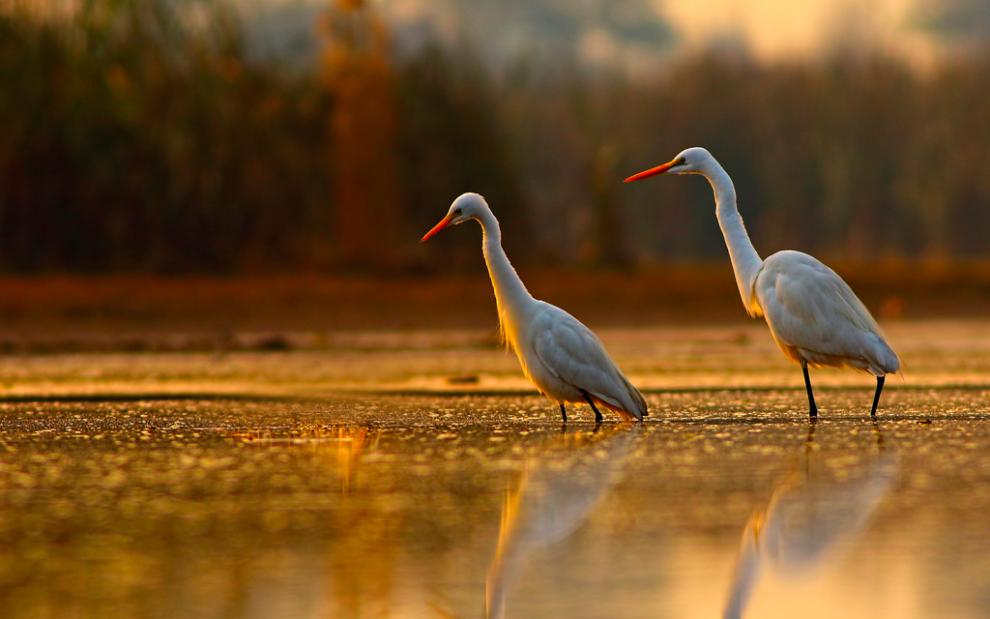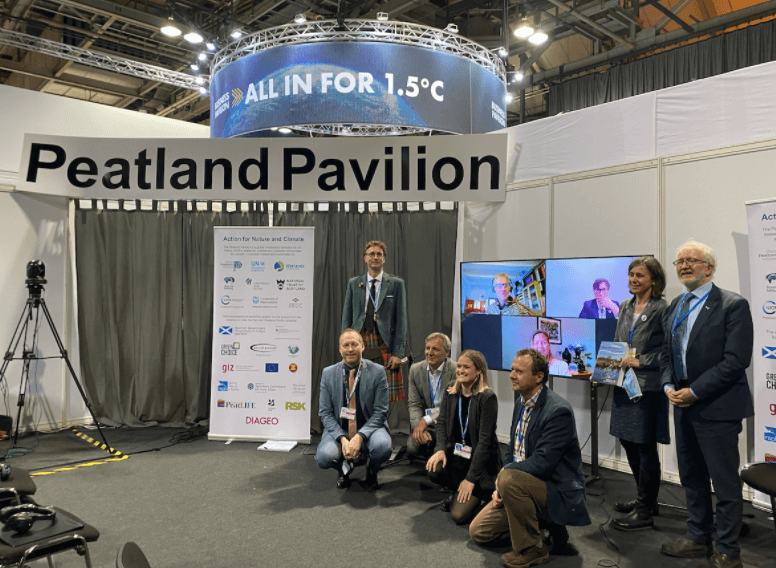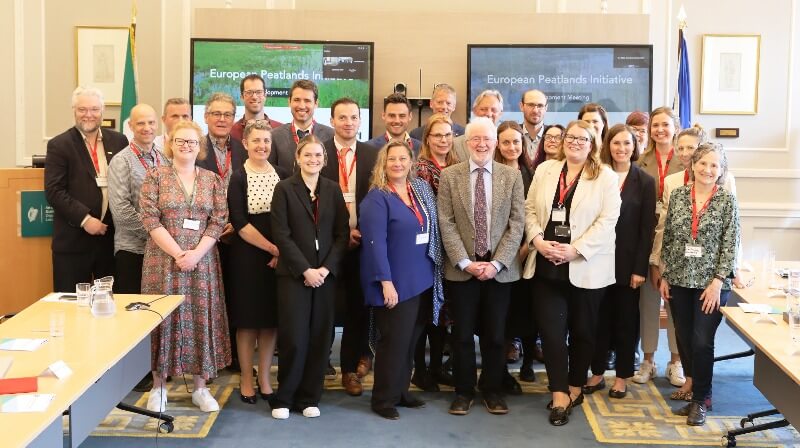Peatlands are fundamental for our ecosystem and there are several initiatives supporting them. Discover more.

Peatlands play a vital role in regulating our planet's climate. These unique ecosystems store enormous amounts of carbon and support diverse plant and animal life. Despite only covering 3% of the earth’s surface, peatlands store twice the amount of carbon stored by terrestrial forests. Recognizing the significance of peatlands in the fight against climate change was a huge outcome of the COP 26 held in Glasgow in 2021 – a major win for peatlands and for wetlands in general. Ministers and representatives from across the EU (Ireland, Netherlands, Scotland, Germany, Lithuania, and Iceland) higlighted the importance of combining efforts at the highest political level to support the protection of wetlands, and peatlands in particular.
Bax &Company, one of the REWET partners, was commissioned an exploratory study report on behalf of the Irish government to assess the interest of stakeholders in the protection of wetlands and the need for a pan-European network to drive forward the development and harmonisation of peatland policies across Europe. “The study findings are the result of a wide consultation process, which included online and in-person workshops and dialogues with over 150 peatlands experts and enthusiasts from over 15 countries across Europe” report Lisa Wiatschka and Pere Giralt from Bax&Company. “The European Peatlands Initiative (EPI) emerged as a necessary pan-European network to provide strong governmental backing to peatland conservation and restoration, increase the harmonization of policies across the EU, create a unified and coherent voice for peatlands and inform about viable solutions for peatland farmers and landowners at scale.”

What is the European Peatlands Initiative?
Initially launched and spearheaded by the Irish government, the EPI is a high-level collaboration between national governments across Europe. It aims to bring together experts, policymakers, and activists to work collectively towards the conservation and restoration of peatlands, while addressing trade-offs and maximising synergies between agriculture, the environment, energy and climate. The European Peatlands Initiative is underpinned by the belief that effective conservation and restoration strategies must be informed by rigorous research and supported by strong collaboration at the highest policy-making level. Ireland's leadership of the EPI so far has facilitated the convergence of stakeholders and interested parties. This collaborative effort culminated in the conceptualization of a pan-European strategy to address the challenges faced by peatlands, articulated through four main pillars:
1. Peatland Policies
2. Practices & Management
3. Science & Technology
4. Business & Network

“Through the European Peatlands Initiative, peatlands are being raised to the highest level on political agendas, by directly involving national governments, together with other significant peatland players. Our role has been to facilitate the conversation between the different stakeholders involved and accelerate progress towards a common goal”, states Sebastiaan van Herk, managing partner at Bax & Company.
As the initiative transitions from its development phase to its preparatory phase, discussions on the steps ahead for the EPI will be addressed by EPI members at the Power to the Peatlands Conference held on September 19th-21st in Antwerp, Belgium this year. Main achievements reached so far will be showcased, together with discussions on the agreement of a roadmap for the future of the initiatives, including the handover of its leadership from the Irish government to another national ministry from within the EPI network. The launch of the EPI is expected for 2024.
Other initiatives to protect peatlands: the Global Peatlands initiative, Carbon Connects and other projects
The EPI is not the only initiative operating to save peatlands. The Global Peatlands Initiative (GPI), a community made by leading peatland experts and institutions formed in 2016 by 13 founding members at the United Nations Framework Convention on Climate Change Conference of the Parties (UNFCCC COP) in Marrakech, Morocco, led by the United Nations. The GPI acts as an overarching umbrella, encapsulating the efforts of various regional initiatives, including the EPI. Others include the Patagonian Peatlands Initiative and the Canadian Peatlands Initiative.
Bax & Company’s role in the peatland conservation landscape extends beyond its involvement with the EPI. It is also a partner of the Global Peatlands Initiative, further solidifying its dedication to this cause and contributing with active participation in the peatland network. Furthermore, Bax & Company is supporting the Carbon Connects project in its efforts to reduce the high carbon footprint of unsustainable peatlands management practices. Carbon Connects tests new bio-based business models and land management practices like paludiculture. In its current phase, Carbon Connects is now linking peatland farmers and landowners to market players and investors to unlock private investments for the conservation and restoration of peatlands. As peatlands store vast amounts of carbon, initiatives like Carbon Connects contribute to a broader understanding of their significance and the potential solutions they offer in the fight against climate change. Bax's engagement in projects like Carbon Connects underscores its commitment to fostering innovation and collaboration in the realm of peatlands conservation.
Carbon Connects runs closely to its sister projects CANAPE, CARE-PEAT, DESIRE and LIFE PEAT RESTORE.
The role of the REWET project in the framework of peatland initiatives
While the REWET project is not officially affiliated with the GPI and EPI, its potential to contribute significantly to peatlands conservation is undeniable. REWET focuses on restoring the water conditions crucial for peatlands' health, aligning closely with the goals of the EPI and similar initiatives. “The EPI tries to give peatlands a voice at a political level and in REWET we try to scale the solutions tested, which also requires political support at the highest level”, says Sebastiaan van Herk from Bax&Company. “There are many European initiatives and European projects, but connecting to the highest political level to the actual stakeholders on the ground is still a task to be done”, continues van Herk. REWET can bring unique results to the European Peatlands Initiative because it covers the entire European continent. Peatlands can vary a lot between themselves and they always come with different political contexts and challenges, such as balancing agriculture, nature, economic affairs and also the more technical side of how to best restore a peatland. “In REWET we have the ambition to accelerate the innovations tested in Open Labs and scale those that work elsewhere in covered countries and beyond”, states van Herk.
REWET, EPI and their connection to the broader Global Peatlands Initiative underscores the global significance of peatlands in climate change mitigation. Bax's involvement, along with other partners, demonstrates the multi-faceted approach required to address complex environmental challenges. As the initiative continues to evolve, its emphasis on research, collaboration, and effective communication is paving the way for a more sustainable future.
“Emissions from peatlands in Europe are more than the aviation and shipping industry combined, so here we should work on lowering emissions”, concludes Sebastiaan van Herk. “What we study should be replicated to as many places as possible and what we learned should reach as many people as possible. We should always go beyond the duration of the project, so the impact on the local community is bigger and deeper than the project conclusions”.
Authors: Lisa Wiatschka, Pere Giralt, Sebastiaan Van Herk (Bax & Company), Mara Mennella (KNEIA)